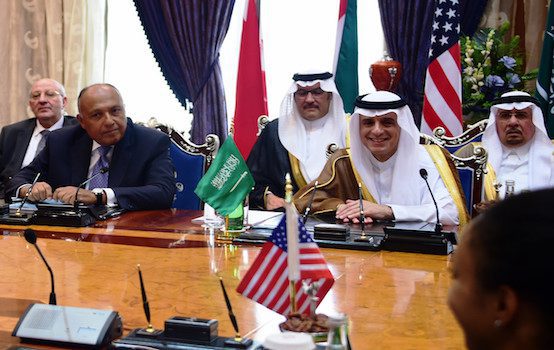The Senate Moves to Block Another Outrageous Arms Sale

The Trump administration has been pressing ahead with a $23 billion arms deal with the United Arab Emirates, but there is an effort in Congress to block the sale of advanced weapons:
Congress will soon have its final chance to rein in President Donald Trump’s foreign policy agenda, with lawmakers preparing to force votes to block a massive new weapons sale to the Middle East.
Trump’s most contentious foreign-policy decisions have often drawn bipartisan rebukes; now the Trump administration’s 11th-hour proposed arms transfer to the United Arab Emirates is coming under scrutiny from members of both parties.
The UAE has been reckless and destructive in its regional conduct. Their military is responsible for war crimes in Yemen and Libya, and they have sponsored militias in both conflicts that have committed their share of war crimes. The UAE violated the terms of its agreement with the U.S. when it provided U.S.-made weapons to third parties in Yemen, and it has demonstrated that it uses U.S.-made weapons to carve out its own spheres of influence rather than defending itself against external threats. Among its many abuses, the UAE and its proxies were running torture prisons in south Yemen. We have seen over the last five and a half years in Yemen how the Saudis and Emiratis have used the weapons that the U.S. has sold them, so there is no reason to believe that selling them more would be in the best interests of regional peace and stability. There is no American security interest served by throwing more weapons at such a government. The U.S. already shares responsibility for the Saudi coalition’s past crimes in Yemen, and that should be reason enough to halt arms sales to all of these states for the foreseeable future.
John Bolton took to the pages of The Wall Street Journal to support the arms sale for his predictable anti-Iranian reasons, and his argument for selling the weapons was just as dishonest and misleading as we would expect from him. For starters, he tells a bald-faced lie when he refers to “Tehran’s nuclear weapons,” and he recites the usual falsehoods about the “windfall” Iran supposedly received from sanctions relief. Of course, Iran has no nuclear weapons, and doesn’t even have a nuclear weapons program. He also uses the bogus claims about the “windfall” to justify additional arms sales, but the reality is that the UAE and its GCC neighbors already outgun Iran in conventional weaponry by quite a lot.
Bolton also misrepresents the war in Yemen as the result of Iranian “intrusion” into the Gulf states’ “backyard.” The truth is that Iran’s role in Yemen was negligible before the war, and to the extent it has grown it has done so in direct response to the indefensible intervention by the Saudi-led coalition. The UAE is still very much involved in Yemen, and it is disingenuous to pretend otherwise as Bolton does. William Hartung notes that the UAE still funds and arms proxies that continue to commit crimes against innocent Yemenis:
The UAE continues to arm, train and pay the salaries of militias that have engaged in systematic human rights abuses. The United States should refrain from selling the UAE arms of any kind until it stops stoking the conflict in Yemen and enter into a peace agreement to end the war.
Bolton says that blocking this weapons sale won’t ameliorate conditions in Yemen. That’s debatable, but allowing the sale to go ahead will almost certainly contribute to future UAE military adventurism at the expense of other countries in the region.
The U.S. has already flooded the region with weapons in the last decade, and that has only encouraged client governments in their reckless and dangerous behavior. The U.S. needs to be cutting back on weapons sales to these governments and ideally cutting them off. The UAE doesn’t need any more U.S.-made weapons, and their government has proven that it can’t be trusted with the weapons it has already received. It is more likely that selling these advanced weapons, including F-35 jets and MQ-9 drones, will encourage Iran to build up its defenses.
The Senate measure to block the deal may fail, or Trump may end up vetoing it as he has vetoed every other resolution aimed at stopping these outrageous arms sales. That doesn’t change the fact that there is no good reason why this arms sale should go forward. Yemeni and Libyan civilians will pay the price of a better-armed UAE, and it is dangerous to entrust a client state with such a dubious record with some of the most sophisticated conventional weapons available.